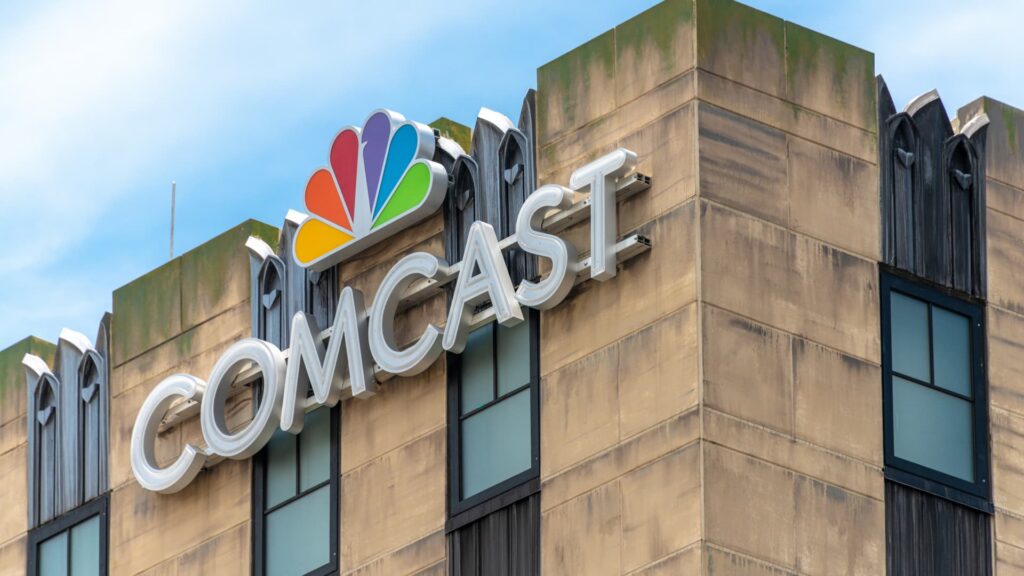Universal Studios, Orlando, Florida, USA – 07/18/2019: Comcast sign logo on the wall of the Universal Studios building. (Photo by Roberto Machado Noa/LightRocket, Getty Images)
Roberto Machado Noah | Light Rocket | Getty Images
comcast The company on Thursday beat Wall Street profit and revenue expectations for the third quarter, but revealed broader pressures in its broadband division that surprised investors.
The company announced it lost 104,000 domestic broadband customers during the period, bringing its total subscriber base to approximately 31.4 million. This marks the fourth consecutive quarter that Comcast has failed to grow its broadband customer base.
Earlier this year, the company outlined efforts to accelerate growth in broadband, a cornerstone of Comcast’s business, as it faces stiff competition from alternative providers, namely 5G companies. The company, soon to be led by co-CEOs Brian Roberts and Mike Kavanaugh, will become even more connectivity-dependent in the new year after the planned Versant deal to offload its cable network assets.
In a conference call with investors Thursday, Cavanagh reiterated that “the broadband landscape remains highly competitive.”
Comcast executives said broadband revenue will decline as the company implements a strategy to focus on mobile, simplify pricing, and strengthen broadband products and WiFi. This decline began this quarter and will continue in future quarters, he said.
Chief Financial Officer Jason Armstrong also said the segment’s average revenue per user (ARPU) growth is not expected as the company focuses on efforts to maintain and grow its customer base. As broadband subscriber growth has slowed or reversed, Comcast has typically focused on increasing its ARPU through price hikes and package upselling.
The change in broadband strategy means that the bright spot that once saw ARPU rise for Comcast is no longer there in the short term.
“As we have said from the beginning, this pivot comes with several costs, including rate reinvestment through pricing simplification, which dilutes revenue, and investments in customer experience, which come with additional operating costs,” Armstrong said on a conference call Thursday.
Armstrong said this was the first quarter that these costs impacted Comcast’s results. This meant a 3.5% decline in earnings before interest, tax, depreciation and amortization across the company’s connectivity and platform business, which includes broadband, mobile, pay TV and other services.
Revenue across the company’s connectivity and platform business was $20.18 billion, down nearly 1% from the same period last year.
“Meanwhile, we are poised for growth with a more durable broadband customer base,” Armstrong said.
The refocus of the broadband strategy also coincided with a change in leadership in the department.
Comcast announced Thursday that Steve Clowney will become CEO of its connectivity and platforms division, replacing longtime leader Dave Watson. Mr Croney is serving as Chief Operating Officer as the Group drives its new strategy.
While Comcast went mobile, its customer base grew. Comcast announced Thursday that it added a record 414,000 mobile customers in the third quarter, bringing its total number of lines to 8.9 million.
Meanwhile, the exodus from pay-TV bundles continues, with Comcast reporting it lost 257,000 customers in the segment during the period. As of September 30, Comcast had 11.5 million domestic pay-TV customers.
The company’s shares fell about 4% in early trading. Comcast stock has fallen about 35% in the last year.
Beyond broadband
Comcast’s overall business, which consists of its Xfinity-branded broadband, cable TV and mobile group and NBCUniversal, beat Wall Street expectations.
Here’s how Comcast’s performance over the same period compares to analysts’ average expectations, according to LSEG.
Earnings per share: $1.12 adjusted vs. $1.10 expected Revenue: $31.2 billion vs. $30.7 billion expected
Net income attributable to Comcast for the quarter ended Sept. 30 decreased 8% to $3.33 billion, or 90 cents per share, compared to $3.63 billion, or 94 cents per share, in the year-ago period.
Adjusted for one-time items such as interest expense and the value of certain assets, Comcast reported earnings per share of $1.12 for the quarter.
The company’s adjusted EBITDA decreased approximately 1% to $9.7 billion.
Overall revenue decreased nearly 3% to $31.2 billion, compared to $32.1 billion in the year-ago period.
Revenue for the company’s media division, which includes NBCUniversal, was $6.6 billion, down nearly 20% over the same period.
Excluding the impact of the Summer Olympics held in the same period last year, sales increased 4% year over year.
Media segment reported EBITDA of $832 million, an increase of 28% year over year, due in part to the impact of streaming service Peacock.
Peacock, which had 41 million subscribers as of Sept. 30 (remaining roughly flat over the past three quarters), posted a loss of $217 million in the quarter, an improvement from a loss of $436 million a year earlier.
A media rights deal between NBCUniversal and the NBA began in October, bringing professional basketball back to broadcast network NBC and onto Peacock. The NBA addition is expected to be a boost for the Peacocks.
Meanwhile, movie studio revenue rose 6% to $3 billion, boosted by the release of “Jurassic World: Rebirth” in July.
Theme park revenue rose nearly 19% to $2.72 billion, and the opening of Epic Universe in May helped the segment’s EBITDA rise 13% to $958 million.
Disclosure: Comcast is the parent company of NBCUniversal, which owns CNBC. With Comcast’s planned Versant spinoff, Versant will become CNBC’s new parent company.


